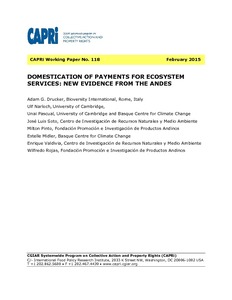Resource information
The current project has sought to assess i) the potential of agricultural biodiversity-focused PES to serve as a cost-effective and socially equitable domesticated diversity conservation incentive scheme, as well as ii) how economic incentive mechanisms such as PES can be designed to build on and complement local institutions of collective action. Results are presented from pilot Payment for Agrobiodiversity Conservation (PACS) schemes and framed field experiments implemented in the Bolivian and Peruvian Andes aimed at sustaining diversity within quinoa, a traditional Andean grain.
Findings indicate that opportunity costs of conservation vary widely not only between the two study sites, but also between community-based groups within each site. This creates opportunities to minimize intervention costs by selecting least-cost conserving farmers. However, as shown with respect to the role of wealth and cooperation in determining opportunity costs, this also has implications for the type of farmer to be included in the conservation programme. Promisingly, depending on the fairness principle deemed most important in the local context, there does not necessarily have to be a significant trade-off between the schemes’ potential cost-effectiveness and equity outcomes. The observed behavior in the farmer experimental games further supports such findings and suggests that understanding farmer perceptions of fairness can have important implications for the design of conservation incentive mechanisms, particularly given the important influence of such perceptions on the pro-social behavior that underlies much de facto conservation. Incentive mechanisms, such as PACS, that can support socially valued ends not only by harnessing selfish preferences to public ends but also by evoking public-spirited motives are also more likely to be sustainable over the long-term.
The use of PACS incentives for the maintenance of traditional crop varieties and the improvement of smallholder farmer livelihoods thus appears promising for further development and up-scaling.



